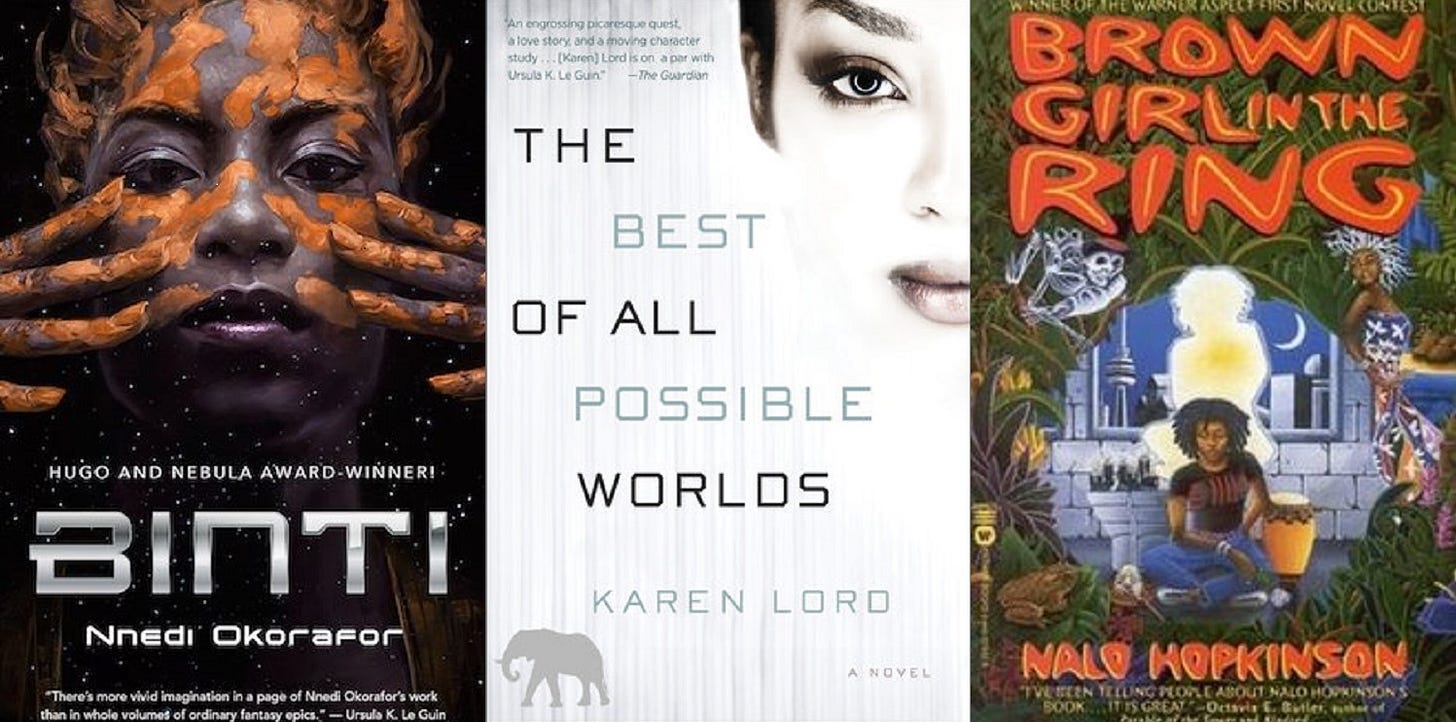Like many other genres, speculative fiction was long a realm of white, male authors. The Golden Age of Science Fiction produced masters in the craft -- Asimov, Clarke, Heinlein, et al – but very little of the work was produced by women or people of color. When the New Wave of science fiction emerged in the 1960s things began to change and voices began to diversify. Then, in the 1970s, Octavia E. Butler arrived on the scene and paved the way for the subsequent strong voices of black women in spec fic.
An avid reader from a young age, I discovered fantasy and science fiction in the 1970s. Anne McCaffrey and Isaac Asimov were early favorites. I devoured pulp sci-fi and collected the Golden Age authors. Ursula K. Le Guin blew my mind and Octavia E. Butler expanded my world. These days I revel in the diversity of voices and viewpoints in science fiction, which only seems to expand, as is apt for the genre. After all, spec fic is about exploring possibilities, with everything on the table.
I read anywhere from 50 to 80 books a year in a range of genres, and in recent years I’ve enjoyed giving myself reading challenges. For example, in 2018 I only read women authors. In 2020 I started the search for black women spec fic authors who weren’t already on my radar. I’m looking forward to a future year when it will be so easy to find copious works that the challenge will be to pare down the list rather than reading absolutely everything by a handful of writers.
In the meantime, the following are very brief introductions to authors I have read for years, those I’ve only fairly recently discovered, and some that are in my enormous “to read” pile. Okay, they have their own bookcase. Telling me I can’t buy new books until I’ve read the ones I already have is an exercise in futility.
This list is not exhaustive; I’m sure there are authors who are just not yet on my radar. If you know of any, please let me know.
Taken from us far too soon, Butler’s vivid and smart prose gave us some unforgettable characters and worlds. Born in 1947, she died in 2006, leaving behind 15 novels, short stories and essays, and an impressive collection of awards and accolades, including Hugos and Nebulas. She also has an asteroid named after her.
An excellent place to start is with Parable of the Sower and the following Parable of the Talents. Published in the 1990s, the setting is the 2020s and there are some eerie parallels to our times. If you like short stories, Bloodchild is excellent.
Nnedi Okorafor won her first award for writing in 2005 and is still racking them up. A good place to start with her works is the engrossing novella Binti for which she won both a Hugo Award and a Nebula Award. You’ll then want to follow up with Binti: Home and Binti: The Night Masquerade. Set in Africa, her works are vibrant and original, often addressing important issues.
And if you like reading a book before it’s put into film, read Who Fears Death before HBO finishes making it into a series.
I find Karen Lord’s works to be smart and sympathetic explorations of people and societies. Her first novel, Redemption in Indigo is a retelling of a Senegalese folk tale. Her sci-fi novels, The Best of All Possible Worlds and the sequels, The Galaxy Game and The Blue, Beautiful World are now high up on my list of all-time favorites.
Her thoughtful, thought-provoking, and ultimately optimistic take on future societies make this trilogy an excellent gateway for people who think they might not like science fiction.
Highly accomplished and awarded writer N. K. Jemison crafts original worlds and complex characters with beautiful prose. Start with the Broken Earth trilogy: The Fifth Season, The Obelisk Gate, and The Stone Sky. If the thought of cities having living souls intrigues you, read The City We Became and The World We Make. There should be another book in the future to make a trilogy. They’re unlike anything else you’ve read.
For as long as Nalo Hopkinson has been around, it’s a little surprising she wasn’t on my radar sooner, as I only “discovered” her a few years ago. She was named the 37th Damon Knight Memorial Grand Master by the Science Fiction and Fantasy Writers of America not that long ago in 2021. She’s long been a master of magic realism influenced by the Caribbean. Start with her first novel, Brown Girl in the Ring, published in 1998. I also recommend Midnight Robber and Sister Mine.
I enjoyed this author’s first novel, The Prey of Gods, published in 2017. I liked the originality, the setting in a future South Africa, queer characters, and the promise of AI and magic to come. Her book Escaping Exodus is in my “to read” pile.
Their alt-history steampunk novel Everfair reimagines the colonization of the Congo and is high up on my “to-read” stack. I think it’s important to note that although I’m including the writer, who was friends with Octavia Butler, in a list of women authors, they are genderfluid and use they/them pronouns.
I’m late to the game with this author, having only recently read An Unkindness of Ghosts, which was published in 2017 and won high praise from a number of prominent writers and critics. Like Nisi Shawl, the author uses they/them pronouns.
A well-known author of supernatural stories, her book My Soul to Keep is in my “to read” pile. I loved Anne Rice’s vampire novels when I was much younger, and this book is in that vein, from what I’ve read. I’m also intrigued by any author recommended by Stephen King. It’s a little embarrassing that I’m late to her game.





